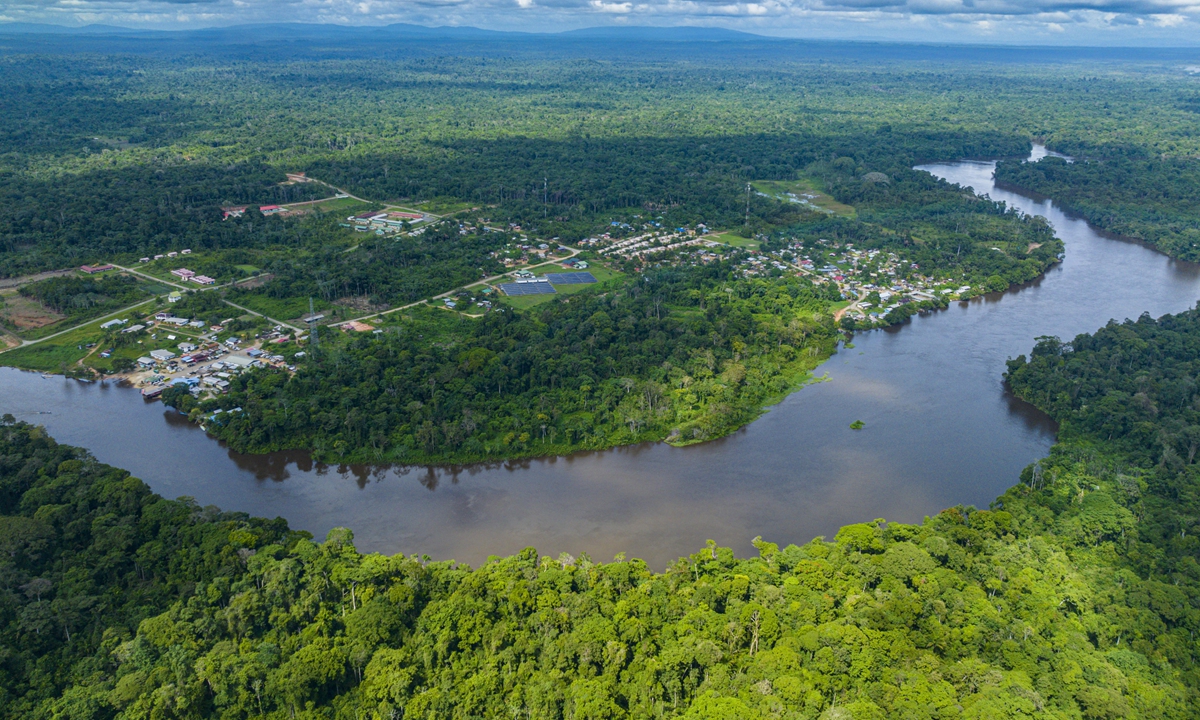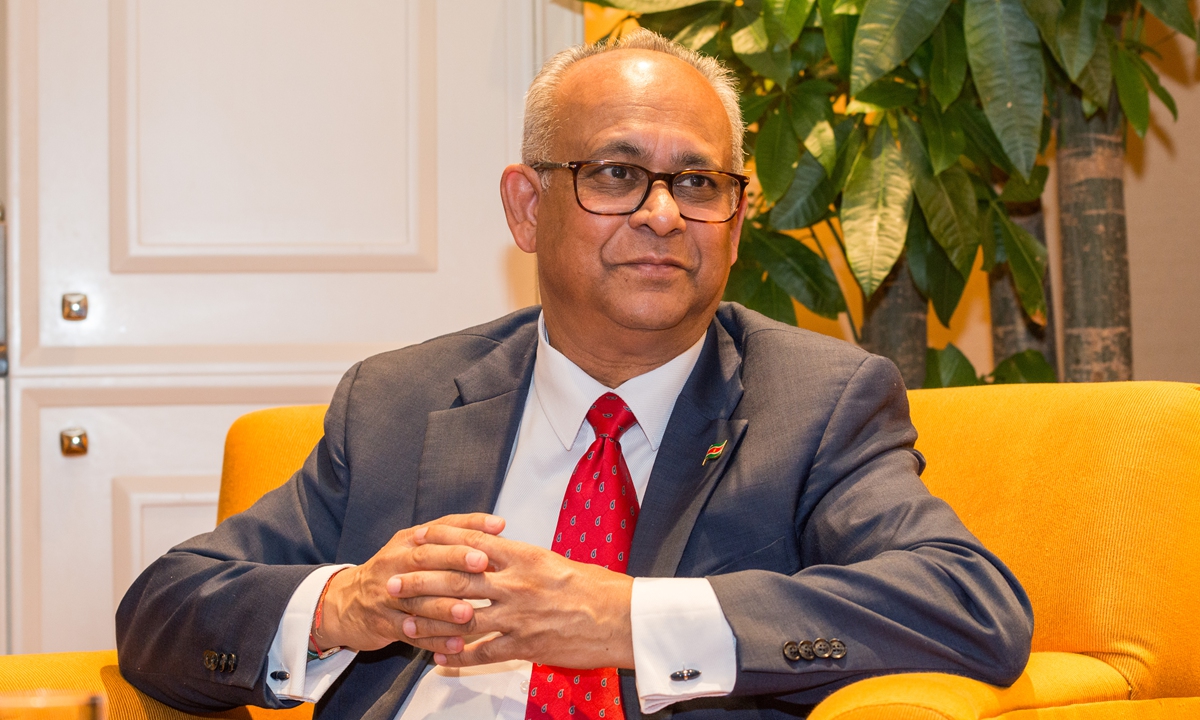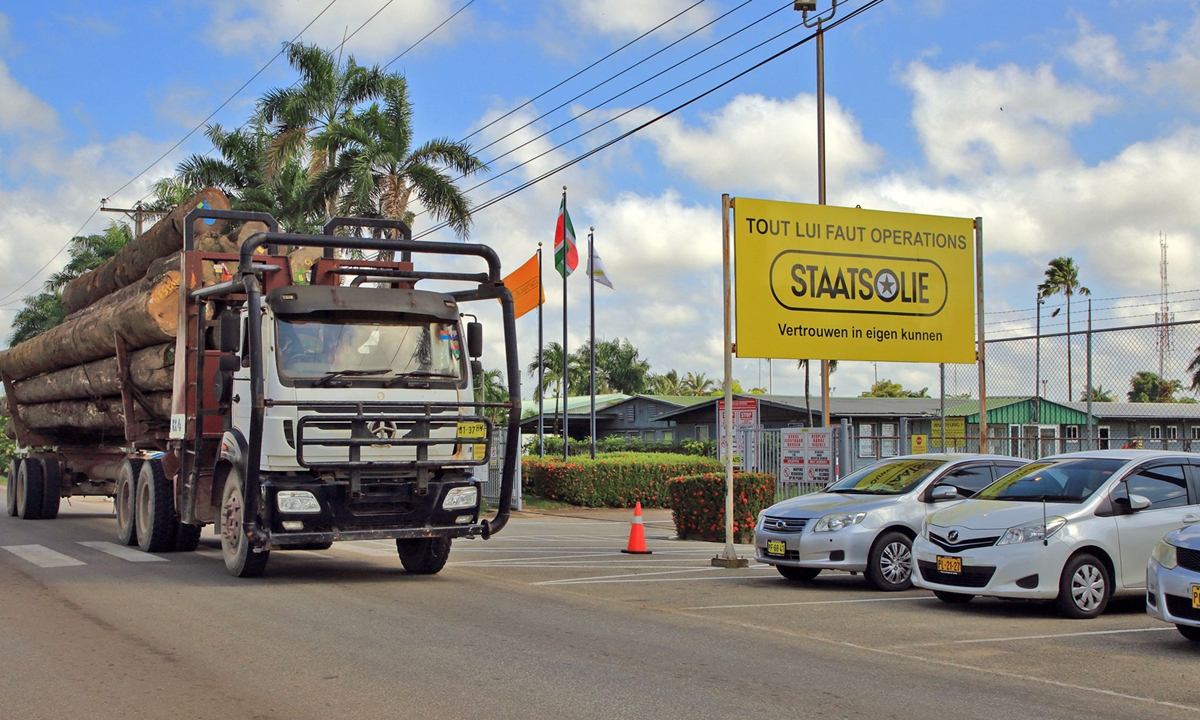
Picture shows the entrance of the Staatsolie refinery, owned by Suriname State Oil Company, in Wanica, Suriname, on September 26, 2022. Photo: VCG
Editor's Note:
Chinese Foreign Minister Wang Yi, on Tuesday, met with Surinamese Foreign Minister Albert Ramdin in Beijing. China and Suriname enjoy a long history of friendship, and this year marks the 170th anniversary of the arrival of the Chinese in Suriname. Wang told Ramdin (
Radmin) that China is willing to be Suriname's reliable partner in the process of development and revitalization and jointly realize modernization. Global Times reporters Chen Qingqing and Bai Yunyi (
GT) conducted an exclusive interview with Ramdin in Beijing on Tuesday, and talked about China-Suriname relations, China-Caribbean relations, and further cooperation under the Belt and Road Initiative (BRI), Global Security Initiative (GSI), and Global Development Initiative (GDI).

Surinamese Foreign Minister Albert Ramdin Photo: Chen Tao/GT
GT: Suriname is among the first Caribbean nations to establish diplomatic ties with the People's Republic of China and stands as a strategic partner. How would you assess the evolution of relations between China and Suriname, and how do you perceive the impact of this cooperation on broader China-Caribbean relations?
Ramdin: The bonds between Suriname and China are both historic and enduring, characterized by a constructive and mutually beneficial friendship. This relationship has significantly advantaged Suriname.
We are staunch supporters of the one-China policy and firmly acknowledge China's territorial sovereignty. Our partnership has yielded multifaceted benefits. We have a dynamic collaboration on the global stage, actively coordinating within various international organizations and at the United Nations.
Our diplomatic missions in Washington, New York, and other locations work together. Suriname boasts a vibrant Chinese community that is deeply integrated into our society, contributing to diverse sectors including commerce, infrastructure, construction, and professional services like law, medicine, and academia.
Chinese culture has also left an indelible mark on Surinamese cuisine, with Chinese dishes being a staple of our national fare.
From a developmental standpoint, trade between our countries is flourishing, and Suriname has welcomed numerous developmental initiatives from China. This positions us as a beacon within the Caribbean, a steadfast ally that can assist China in fostering cultural and developmental ties within the CARICOM region.
GT: There's a noticeable trend of Central American nations endorsing the one-China principle and severing official ties with the Taiwan authorities. How do you interpret this shift? And with the US increasingly challenging China on the Taiwan question, what stance do Caribbean countries take?
Ramdin: Suriname's stance has always been clear; we recognize only one China, and we steadfastly support that principle.
The shift toward the one-China principle seems primarily driven by China's engagement and diplomatic persuasion. The trend of recognition speaks to that effective outreach.
Suriname advocates for the peaceful resolution of conflicts. The Taiwan question, we believe, should be resolved peacefully and through negotiation. As this understanding spreads, more nations will see the tangible benefits of a partnership with China. We must always seek peace and solution-oriented approaches to conflict.
China's role is significant and growing in Latin America and the Caribbean region, especially in trade, investment, and diplomatic relations. Through various initiatives, including the BRI, China supports regional development, fostering a stronger appreciation within the global context.
GT: With the 10th anniversary of the BRI, Suriname stands as the first Caribbean country to have signed a cooperation memorandum with China. What significant outcomes have emerged from this cooperation, and what local transformations have it spurred these developments on in Suriname?
Ramdin: The BRI has facilitated development support and financing for significant projects. Notably, the financing of a new hospital in one of our districts through the BRI has enhanced healthcare services. Infrastructure projects, including road and bridge construction, have also been vital. Looking ahead, we aim to leverage BRI support further, not just in infrastructure but also in energy and agriculture as we develop our oil and gas industry.
Our bilateral relations have evolved to focus not only on the past but on future aspirations. A pressing issue is our debt restructuring; we're engaging with China to resolve this. Our goal is to reach an agreement by year's end.
Fiscal responsibility dictates that we borrow within our means to ensure repayment. Past excessive borrowing has led to our current debt challenges, which we are now striving to restructure.
Our discussions with China have centered on enhancing our future relationship in three areas: Continuing our political and diplomatic relations, bolstering private sector engagement for targeted project execution, and expanding functional cooperation in various sectors, including healthcare, agriculture, energy, justice, security, and cultural exchanges. Establishing a sister city relationship between Paramaribo and Dalian exemplifies our commitment to a robust partnership, and we look forward to nurturing the Chinese diaspora's significant role in Suriname.
GT: Suriname has been an active participant since the inception of the China International Import Expo approaches, the sixth event of which is fast approaching. What outcomes do you anticipate from this year's event, and in what areas does Suriname hope to find further cooperative opportunities with China?
Ramdin: The Expo is notably focused on facilitating imports into China, which is unique and indicative of China's openness to global trade. Our current focus is on agricultural products, as we explore the Chinese market's requirements. We believe Suriname can contribute, particularly with processed agricultural products, to the diversifying Chinese market.

Picture shows the entrance of the Staatsolie refinery, owned by Suriname State Oil Company, in Wanica, Suriname, on September 26, 2022. Photo: VCG
GT: Instability and uncertainty are increasing in today's world, and the pursuit of security and peace by humanity is even more urgent. Security has become a necessary prerequisite for development, which is an important consensus among leaders around the world, including those in the Caribbean region. How does Suriname view China's proposals for the GDI, the GSI, and the Global Civilization Initiative (GCI)? What significance do these three initiatives have for the development and security of Suriname?
Ramdin: Not only for Suriname, I think, but also for the whole world, these are very important topics: Security, development, and connecting countries. I know that there was, for instance, also a discussion on civilization today at the global conference here in China. These are very important initiatives, because if we want to solve problems in the world, we need to talk; we need to have trust in each other. And these conferences help develop that trust in the first place. Secondly, I'm very pleased to see that countries like China are willing to put funds into these initiatives.
So when we speak about development initiatives, it cannot just be talk. There must be a program. There must be an action plan. When it comes to development and climate change, for instance, carbon emissions are very important issues. So it's good, in my view, that a country that has such a strong leadership position in the world takes initiatives to bring countries together and provide support. The same goes for security.
It's good to hear different perspectives on security, but it's good to talk about it as well.
We firmly believe in our foreign policy that any conflict, as I said before, should be resolved by meeting and discussing it. These initiatives will also facilitate a peace process, stability in the world, and also better understanding among countries and among peoples. Thats what we need, in the end - a peaceful world where conflicts are mitigated, and where people can live in prosperity and with equality.
GT: China and Suriname have a tradition of friendship. This year marks the 170th anniversary of the settlement of Chinese people in Suriname, and Suriname is the first country in the Western Hemisphere to designate the Spring Festival as a legal holiday. What broad prospects do you think there are for future cooperation between China and Suriname in various fields, including cultural exchanges? What new breakthroughs do you hope to see in the future?
Ramdin: I believe that we want to have a strong relationship between countries, especially countries which are far apart. There is a large geographical distance between Suriname and China so it is very important to have people to people contact.
So I would like to see the Chinese community and the Chinese people in China visit Suriname. For that, we will need flights. We need good connections. So this is one thing we would like to work on, to build those connections, because I think with the growth of the Chinese economy, we will see more movement and more time to go abroad. So we would like to see a lot more people-to-people contact. That's one aspect - tourism development.
And we would like to see Chinese companies also invest in the hospitality industry, in hotels, restaurants, and so on.
Secondly, I think from people-to-people contact, more understanding will come because China is so diverse in culture. I've always said to the Chinese Ambassador there needs to be more cultural events organized on a regular basis, where we can see the Chinese culture and he agreed.
The Chinese ambassador has organized a couple of such events, and I hope it will continue including into areas of historical significance like literature, art, music, and clothing. All of that is very relevant, because then you get a better understanding of each other's cultures.
We want to do the same. We wish for our embassy in Beijing to showcase Suriname here. I think it's also important in terms of people to build relations, not only between the governments at the highest political level, but also at the provincial and city level. So sister cities will create closer connection at the people-to-people level between countries. And that will strengthen that relationship.
We already have a very good relationship. We are very pleased about it, but it's always possible to strengthen that relationship; to deepen it and to broaden it in more areas.
I strongly believe that having a strong friendship can result in a better life and a better economy for both countries. We are a small country, but this enormous diversity. I believe we can add something to in a small way. But I think we can also benefit from Chinese culture and the Chinese economy.






